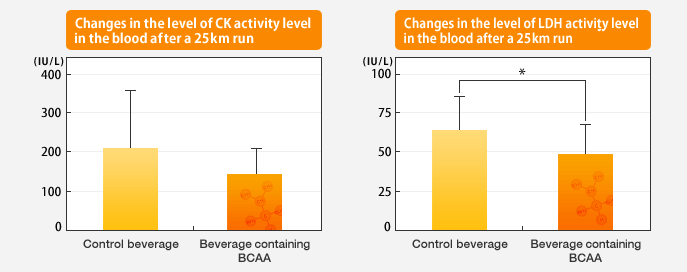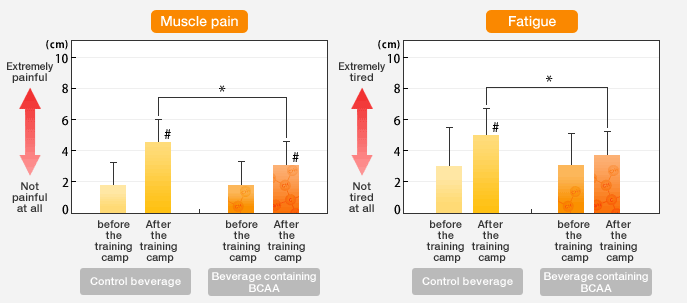Is BCAA effective against post-exercise muscle pain and fatigue?
BCAA's effect on muscle damage
During strenuous exercise the concentrations of muscle damage indicators such as creatine kinase (CK) and lactate dehydrogenase (LD or LDH) in the blood rise. We researched what effect BCAA has on deviation enzyme activities in the blood.
We asked 8 male long-distance runners who were at a university track and field training camp to drink 3 bottles per day of either a beverage containing BCAA (6,000 milligrams of BCAA per day) or a control beverage, starting 3 days before a 25 kilometer run. On the day of the run, they drank 250 milliliters of the same beverage again 30 minutes before starting, then as much as they wanted every 5 kilometers. They were then checked for their creatine kinase (CK) and lactate dehydrogenase (LDH) levels.

* indicates a significant difference (p<0.05) from the control beverage
Source: J SPORTS PHYS FITNESS, p316, 47, 2007
The average amount of BCAA intake before and during the 25 kilometer run was 2,400 milligrams.
CK and LDH levels rose in both the BCAA beverage and the control beverage groups, but the rise in LDH in the BCAA beverage group was significantly lower than that in the control beverage group.
Conclusion: Muscle damage can be reduced by BCAA intake during a long-distance run
The effect of BCAA on muscle fatigue and muscle pain
Based on test results showing that BCAA is likely to reduce muscle damage, a study of both muscle fatigue and muscle pain based on the hypothesis that BCAA may also have an influence on these two conditions was conducted.
An experiment focused on muscle pain and fatigue was conducted on long-distance athletes at a training camp. We asked 12 male and female long-distance runners during intensive training (males ran 86km, females ran 64km) to drink 2,500ml per day of either a beverage containing BCAA (20,000 milligrams of BCAA per day) or a control beverage every day for a total of 3 days.

Muscle pain and fatigue were accessed using the VAS (Visual Analogue Scale) on a 10cm linear scale.
* Indicates a significant difference (p<0.05) or a difference with the control drink.
# Indicates a significant difference (p<0.05) with before the training camp.
Source: J SPORTS MED PHYS FITNESS, p424, 49, 2009
Compared to before the training camp, at the training camp muscle pain increased in both the control beverage group and the BCAA beverage group, but the muscle soreness in the BCAA beverage group was significantly lower than that in the control beverage group.
Also, compared to before the training camp, at the training camp, while fatigue increased significantly in the control beverage group, in the BCAA beverage group, fatigue didn't increase significantly. This indicates that fatigue is suppressed by the intake of BCAA.
Conclusion: Continuous intake of BCAA reduces muscle pain and fatigue
For example, in situations such as training camps in which you are repeating highly strenuous exercise, BCAA can contribute to the kind of physical condition required by high-level training.






